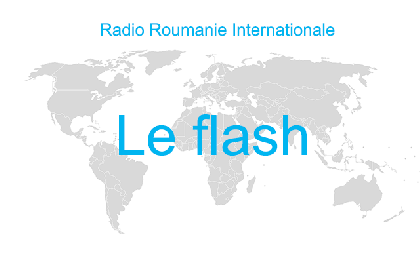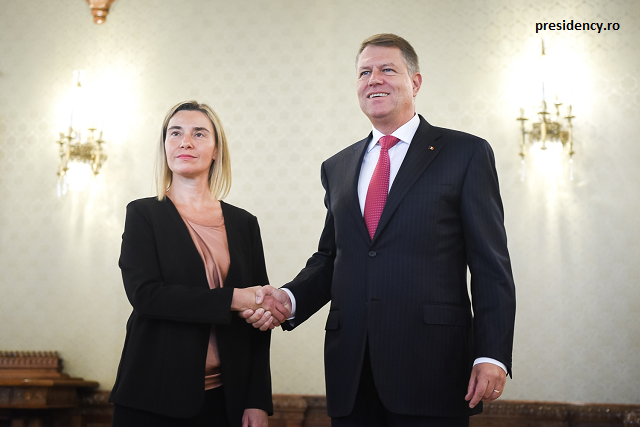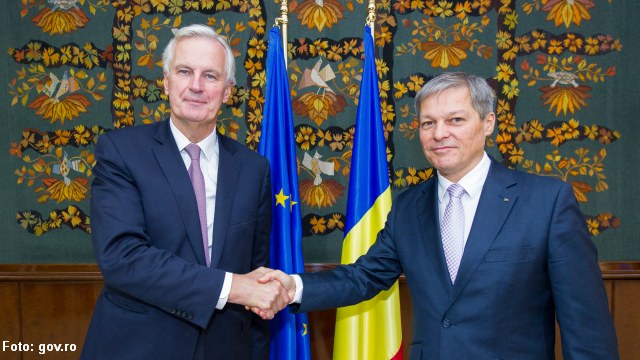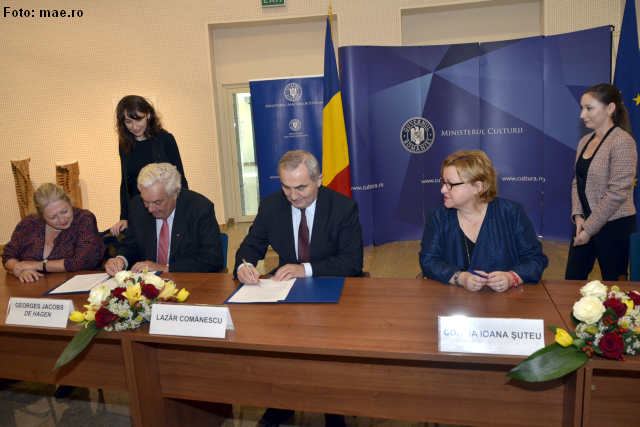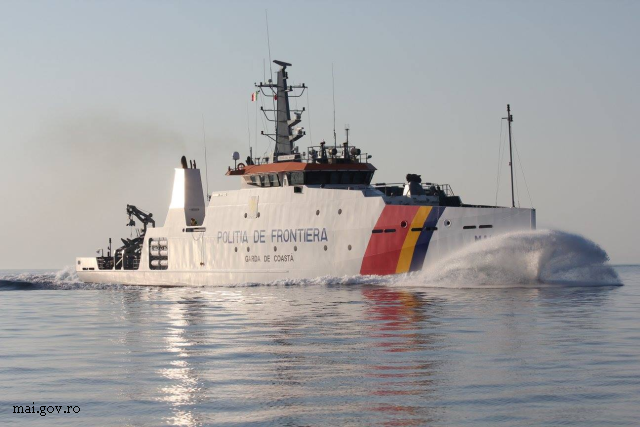COMMEMORATION – The Jewish and Roma victims in Nazi extermination camps were commemorated on Monday at the Holocaust Memorial in Bucharest. The National Holocaust Victim Commemoration Day is celebrated on October 9 in Romania. In a message delivered on this occasion, president Klaus Iohannis said honoring the victims of the Holocaust is a fundamental duty of the Romanian state. In turn, Prime Minister Dacian Ciolos said commemorating the victims of the Holocaust calls for a moment of reflection over some of our national historys dark chapters, learning the lessons of the past so that such tragedies may never happen again. On this day in 1941, the deportation to Transdniester of the Jewish population of Bukovina and Bessarabia began. The Romanian authorities officially accepted responsibility for the Holocaust in Romania in 2004, based on the conclusions of a commission headed by Nobel Peace Prize winner, Ellie Wiesel.
TALKS – President Klaus Iohannis and his Slovakian counterpart Andrej Kiska discussed the consolidation of bilateral relations at political, economic and cultural level in Bucharest. Talks also tackled hot topics on the European agenda, given that Slovakia is holding the six-month rotating presidency of the EU Council. The two presidents also exchanged views referring to the EU Enlargement Policy and the Eastern Partnership, as well as regarding the future of the EU, a topic approached last month at the informal EU Summit in Bratislava. As part of NATO cooperation, president Iohannis reasserted the importance Romania gives to boosting NATOs capability of responding to current security challenges, against the backdrop of the recent developments in the Black Sea region. On the other hand, Iohannis and Kiska highlighted that the Slovakian minority in Romania and the Romanian community in Slovakia have a substantial contribution to the development of ties between the two states. On Tuesday, President Andrej Kiska will meet with representatives of the Slovakian minority in Romania in Nadlac, western Romania.
MOTION – The Social-Democratic Party on Monday filed a simple motion against Justice Minister Raluca Pruna, who publicly admitted she lied at the European Court of Human Rights regarding funding allotted to the prison system. Last week at the Supreme Defence Council meeting Raluca Pruna said she lied when saying that Romania allots a 1-billion-euro budget to seven prisons. The information provided to ECHR judges was based on official documents, whereas in fact the money was not stipulated in the budget. According to the Chamber of Deputies regulations, the Government is not compelled to sack the Justice Minister, even is Parliament votes for the motion.
VISIT – EU Commissioner for Research, Science and Innovation Carlos Moedas is on Tuesday paying an official visit to Bucharest. He will meet with Prime Minister Dacian Ciolos, Education Minister Mircea Dumitru, the president of the National Authority for Scientific Research and Innovation, Mihai Robert Dima, and with Romanian Academy president Ionel Valentin Vlad. Additionally, Commissioner Moedas will visit the ELI-NP laser project in Magurele.
TOUR – As of Tuesday the Romanian Foreign Minister Lazar Comanescu will go on a four-day tour of Asia. According to the Romanian Ministry of Foreign Affairs, the tour includes an official visit to Indonesia, aimed at boosting diplomatic bilateral dialogue and consolidating economic cooperation with this country. On Thursday and Friday, the Romanian Foreign Minister will attend the 21st Ministerial Meeting of the European Union – Association of South-East Asian Nations (EU-ASEAN) in Thailand. On the sidelines of the meeting, Lazar Comanescu will hold a series of bilateral relations with his counterparts from ASEAN countries.
NOBEL PRIZE – The Royal Swedish Academy of Sciences on Monday announced the names of the winners of the Nobel Prize in Economic Sciences. Professor Oliver Hart and Professor Bengt Holmstrom of the Massachusets Institute of Technology were awarded the prize, for their insights into how best to write contracts. Their work paved the way for institutions and policies in many fields, from bankruptcy legislation to constitutional policies, the jury explained. The winner of the 2015 Nobel Prize in Economic Sciences was the American professor Angus Deaton, for his analysis of consumption, poverty and welfare. The Nobel Prize for Economic Sciences has been awarded since 1968 by the Central Bank of Sweden, unlike the other prizes which are financed by the Nobel Foundation. The 2016 Nobel Prize season concludes this week with the award for literature.
US PRESIDENTIAL DEBATE – The nominees of the Republican and Democratic parties in the US election, Donald Trump and Hillary Clinton, Sunday night clashed in the second presidential debate. According to a CNN poll, 57% of the American viewers believe the debate was won by Hillary Clinton, while 34% say the winner was Trump. Also, 39% of the respondents said Hillary Clinton did better than in the first debate. Donald Trump attacked ex-President Bill Clinton, Hillarys husband, and accused her of having “deleted 35,000 emails that had allegedly ruined peoples lives. In turn, Hillary Clinton claimed Russia was getting involved in the US election in order to have Donald Trump win the race. The two candidates also disagreed over the way to handle the crisis in Syria, but according to commentators none of them suggested a concrete solution.
FOOTBALL – Romanias football team is playing on Tuesday in Astana against the national team of Kazakhstan, in its third preliminary game in the 2018 World Cup in Russia. On Saturday, in Erevan, Romania defeated Armenia, 5-0. In the same group E, Poland won 3-2 against Denmark, and Montenegro beat Kazakhstan 5-0. With 4 points each, Romania, Montenegro and Poland top the group table. Last month the national team drew at home against Montenegro, 1-1, in the first game with the German Cristoph Daum as the first foreign manager of the Romanian team. This autumn Romania is to also play at home against Poland, on November 11.
TENNIS – The best-ranking Romanian tennis player, Simona Halep, is as of Monday no. 4 in the WTA standings, one place up since last week. Halep is already qualified into the WTA Finals, a tournament that brings together the best 8 players of the world and held this year in Singapore, between October 23 and 30. Angelique Kerber, of Germany, is the WTA leader, followed by American Serena Williams and Polands Agnieskza Radwanska. Four other Romanian players are in the WTA Top 100: Irina Camelia Begu (no. 28), Monica Niculescu (no. 50), and Sorana Carstea (no. 83).
(Translated by A.M. Popescu and V. Palcu)

